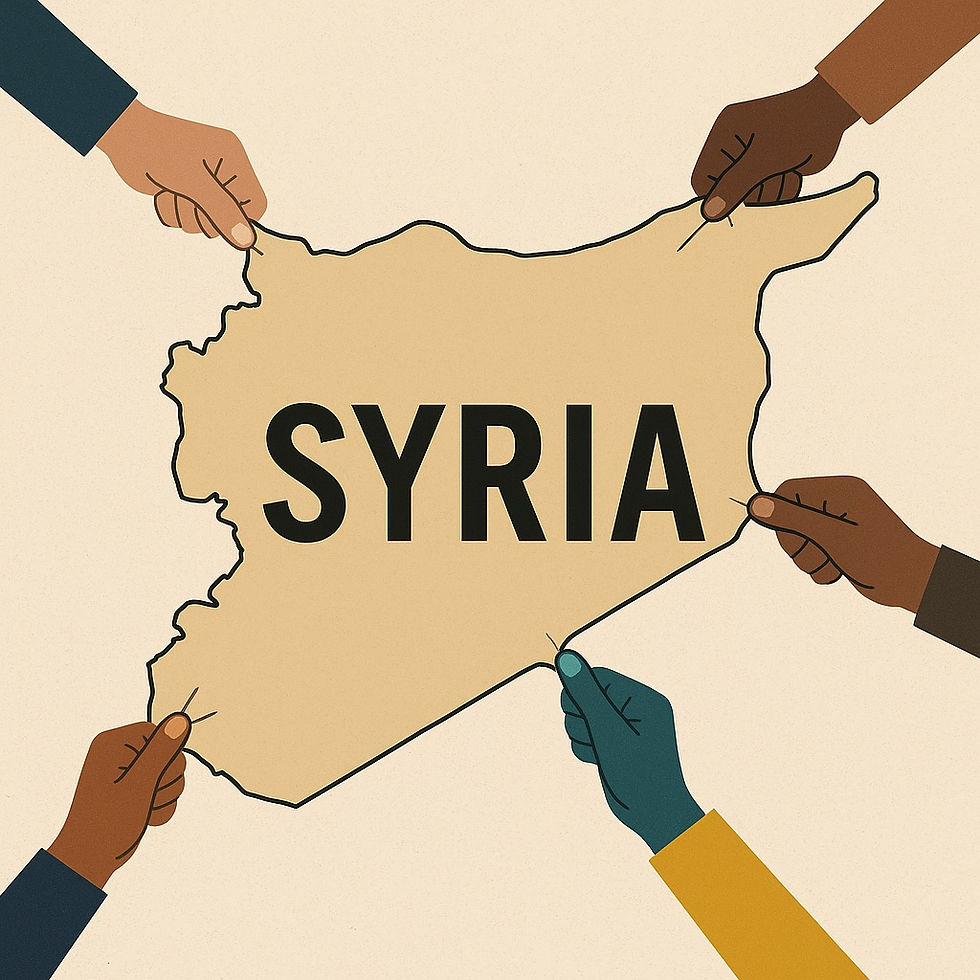Current State of Syria – Under Interim President Ahmed al Sharaa
- lhpgop
- Jul 16
- 3 min read

Current State of Syria – Under Interim President Ahmed al Sharaa
🔹 Leadership & Governance
Ahmed al Sharaa (formerly Abu Mohammad al‑Julani), leader of Hayat Tahrir al‑Sham (HTS), has been the de facto head since overthrowing Bashar al‑Assad in December 2024, and was officially named interim President on January 29, 2025, with Syria’s interim constitution suspended VG+15Al Jazeera+15Oregon Public Broadcasting+15.
He has formed a transitional government and established a temporary legislative council, promising inclusive governance during a transitional period that could last up to five years Wikipedia+7Wall Street Journal+7The Times+7.
🔹 Political Landscape & Challenges
Key institutions—Ba'ath Party, Assad-era constitution, and military structures—were dismantled or suspended, with a new interim constitution ratified March 13, 2025 AP News+15Wikipedia+15Al Jazeera+15.
Al Sharaa has vowed to integrate all armed groups, including HTS, into a unified national army France 24+15Al Jazeera+15Encyclopedia Britannica+15.
He’s coordinating a National Dialogue Conference aiming to rebuild bridges between sectarian, ethnic, and political factions House of Commons Library+12Wikipedia+12Wikipedia+12.
🔹 Regional & International Engagement
Al Sharaa has undertaken diplomatic outreach—meeting with Saudi Crown Prince MBS, U.S. President Trump, and Azerbaijani President Ilham Aliyev—to secure sanctions relief, energy deals, and reconstruction aid TIME+15ABC News+15AP News+15.
The U.S. has lifted certain sanctions contingent on reforms, and Syria is receiving cautious recognition from Gulf and Western nations .
🔹 Security & Sectarian Tensions
Sectarian violence—particularly in Sweida involving Druze, Bedouin tribes, and government-aligned forces—has triggered Israeli airstrikes targeting Syrian military assets to “protect the Druze.” Clashes have led to hundreds of deaths and a fragile ceasefire AP News+3The Times+3TIME+3.
Al Sharaa's government faces intense pressure in restoring stability, controlling security forces, and reducing foreign military interventions The Times+15AP News+15Al Jazeera+15.
Takeaways
Syria is now led by Ahmed al Sharaa, not Assad, operating under a 5‑year transitional framework involving constitutional and institutional reforms.
The nation remains fragmented and volatile, with violent sectarian flare-ups and foreign military actions complicating governance.
Al Sharaa is navigating a complex path—balancing hardline roots, pledging pluralism, while seeking international legitimacy and rebuilding the state.
A LIST OF SOME OF THE PLAYERS
🔹 Syrian Regime (SAA)
Assad’s forces have regained control over much of western Syria through Russian and Iranian military backing.
Despite reclaiming territory, the regime remains strained by sanctions and struggling economically.
🔹 Kurdish Forces (PKK/YPG)
The PKK, primarily Kurdish, is labeled a terrorist organization by Turkey, impacting regional dynamics.
Kurdish-led groups in Syria, notably the YPG, have leveraged U.S. support in the fight against ISIS.
They pursue autonomy in northeastern Syria, controlling local governance and security.
🔹 Minority Communities
Druze: Concentrated in southern Syria, historically maintain neutrality but are now under pressure from various factions.
Assyrians/Syriacs, Circassians, and others hold small pockets of influence, often allying with Kurdish groups or the regime for protection.
🔹 Regional & International Actors
Turkey conducts cross-border operations to curb Kurdish autonomy and influence in Syria.
Russia and Iran continue supporting Assad both militarily and politically.
The U.S. maintains a presence in the northeast, primarily focused on ISIS containment and supporting Kurdish forces.
🔹 Main Themes
Divided governance: Western Syria under Assad, northeast under Kurdish control, southern areas with Druze and rebels.
Fragile alliances: No single power dominates fully—each ally remains cautious of betrayal.
Ethno-religious balance: Minority survival hinges on fluctuating alliances and external protection.
Future prospects: Stability remains distant; political resolution appears remote, and international tensions persist, especially involving Turkey and U.S.–Russia presence.
Takeaways
Syria remains a patchwork of control zones, lacking centralized governance.
Minorities are trying to navigate survival amidst competing powers.
The ongoing foreign involvement ensures the conflict's complexity endures.




Comments